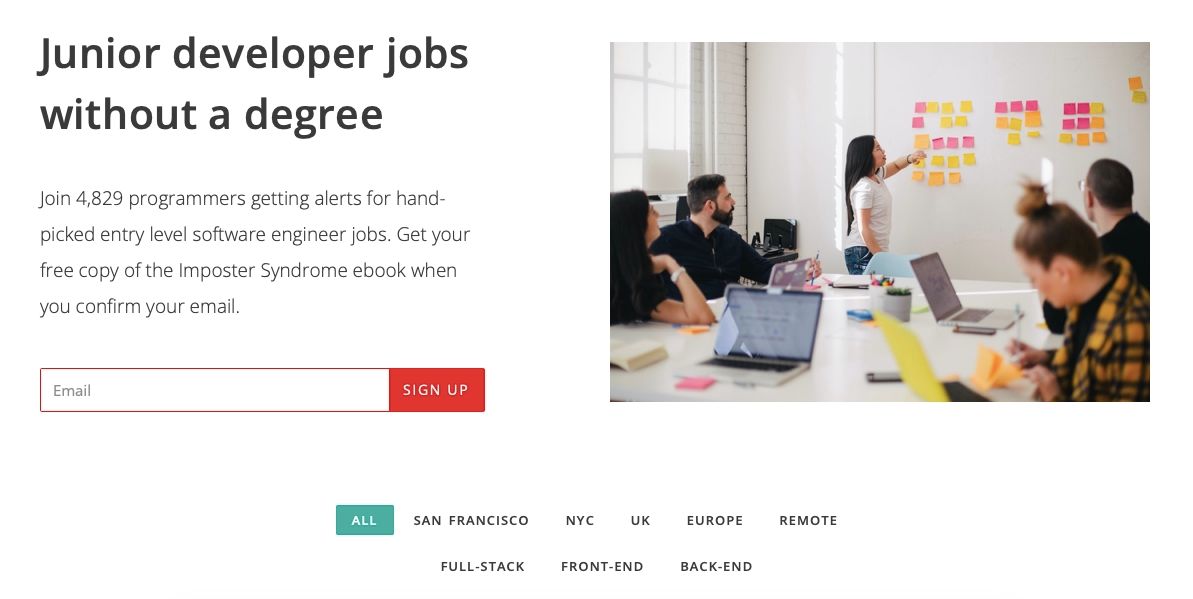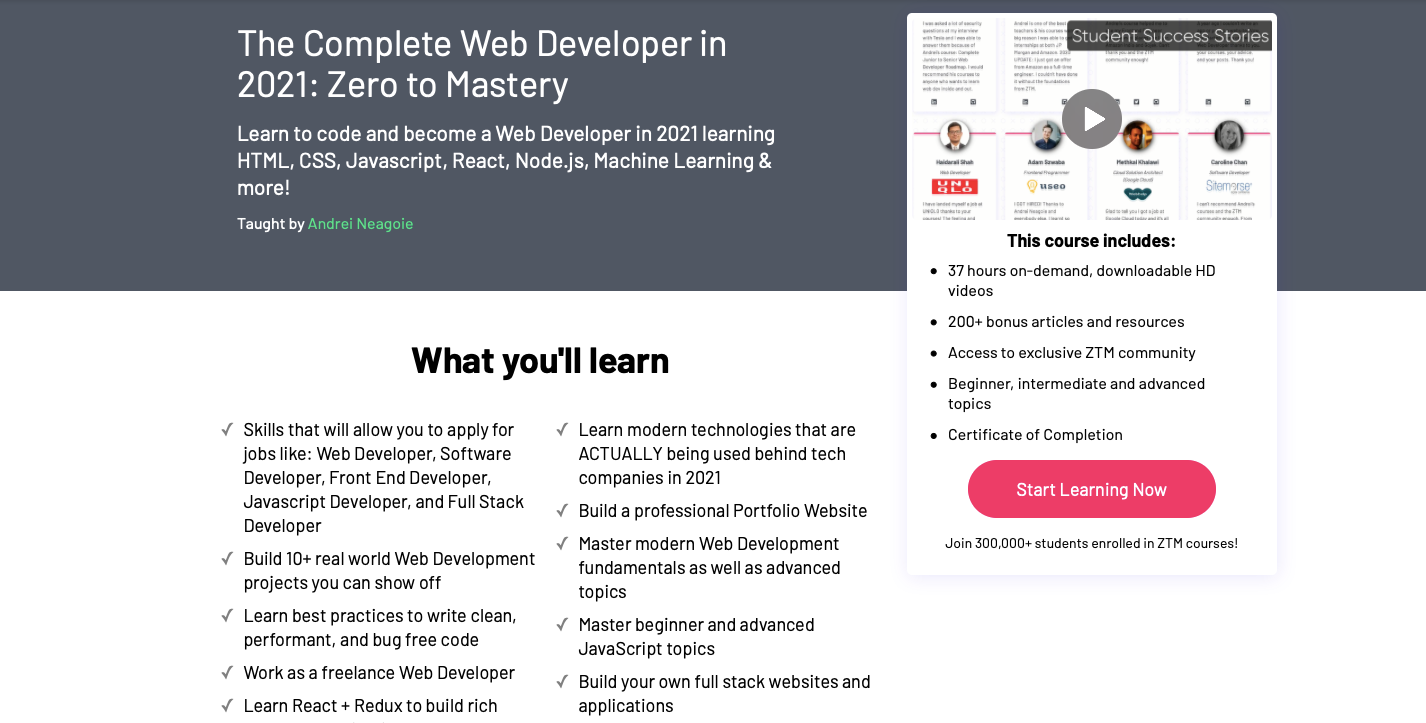Jack is a self-taught developer working on Shopify websites. In this interview he shares his tips on learning to program without a degree. Jack also covers the benefits of learning to code and the pros and cons of being a freelance developer.
Hey, so can you introduce yourself?
Hey No CS Degree, my name is Jack Harner. I’m a Freelance Web Developer & E-Commerce Consultant based out of Denver, Colorado. I’ve been working as a freelancer full time for about a year and a half now , but I’ve been building websites in some form or fashion for about 10 years. These days I primarily do E-Commerce development work (Shopify & BigCommerce) but I also do plenty of WordPress work.

Why did you learn to code?
I’ve been interested in computers from a very young age. My dad’s worked for Intel pretty much my entire life so computers were always around. As a kid I really wanted to learn about video game development. One of my first programming projects was building a playable Tic Tac Toe with Visual Basic in Microsoft Excel (with a ton of help from my dad).
Somewhere along the line I pivoted into Web Development and then eventually E-Commerce (helping other people make money is the easiest way to make money). Once I got to the point where I felt comfortable selling my services, it was over for me working a “real job”. I was enthralled by the possibility of a high salary and getting paid to “play with computers all day” so I dove in head first.
How did you learn coding?
Excluding 1 Intro to Python class I took in college ( before I dropped out ), I’m entirely self taught. My introduction to HTML & eventually more complex web development was through the site called NeoPets. If you’re unfamiliar, it was an online trading card game where you collected creatures and cared for them, online Tamagotchi if you will).
They gave you a single text box to fill with HTML that would show up as a personal page at a real live URL. From there, I was hooked! I spent the next 15+ years Googling “How do I do _____ with <HTML | CSS | JS>”. Eventually enough of it stuck to get me to where I could sell full websites and custom solutions to businesses.
I initially progressed into building more dynamic sites with WordPress and PHP. Once I had a solid grasp on customizing WordPress I hit the point in my coding career where I knew I could build anything I really put my mind to. That’s such a liberating experience (and a testament to Wordpress’ extreme flexibility as CMS).
I’ve been doing this for so long that I’m not really sure what I would do differently. If I was starting over in 2022 knowing absolutely nothing, I would probably focus on getting proficient in React / Modern JavaScript as quickly as possible.
Although, having the WordPress / PHP / MySQL experience that I do has made it possible for me to be a full-stack developer, manipulating both the front-end and the back-end with ease.
That’s why my brand slogan is “Jack of All Trades, Master of Some”. I know a little bit about a TON of different stuff, and a TON about a few things. I’ve coined this idea as being a T H I C C Developer, which really widens the net of problems I’m able to solve for clients.
How has your life changed since learning to code?
Learning to code and eventually transitioning to freelancing full time has allowed me to move out of my home state, double my salary, reduce the amount of hours spent working every week, and really allow me the time freedom to do whatever I want to do.
Pre-coding, I was working various retail and fast food jobs. Anyone who’s worked with the general public knows they are just soul crushing and life draining jobs.
I did, however, get my first programming job working at this burger joint down in Albuquerque called Lumpy’s Burgers. I started as a burger flipper and then got promoted to assistant manager there. Once on the inside, I figured out pretty quickly they needed some serious website help.
Among several other things, I built for them an employee portal that converted the weekly schedule from a printed out spreadsheet to an online version for access from anywhere. This was ultimately a selfish build because I got tired of forgetting when I worked. I even built out the ability for managers to modify the digital schedule that way people could see if the schedule changed after it’d been posted.
What does a typical day as a software developer look like for you?
My day is thankfully very free-form. Outside of the occasional morning meeting, I wake up whenever I want to. I have a very relaxing morning routine that involves a fresh cup of coffee and tending to my many house plants. Once I’m nice and awake, I hop in and check in on all of my clients to get a sense of the urgent priorities for the day.
After that I get to work for about 3-4 hours straight before getting some lunch. Depending on the workload for the day/week, after lunch I’ll work for either a few more hours or really late into the night. If things are lighter and I don’t have any plans with friends, I spend the evening hours working on my portfolio, my blog, or one of my many side projects.
My favorite part about being self employed is the flexibility in my schedule. My typical day is either spent working all day and late into the night, or it’s spent working a couple hours in the morning and out with friends from early afternoon to late at night. I can choose to take pretty much any day off, as long as I make sure to spend the next full day or two working.
How did you get your first freelance web development job?
My first freelance web development gig came after I was building websites for Lumpy’s. One of my friends had just started working for this small Anime studio in Tokyo.
They needed a website for cheap. I wanted to start freelancing. It was a match made in heaven. I charged them way less than I should have, but it was my first gig so I didn’t really care. At the end of the day, it got the ball rolling that led to me being able to freelance full time.
It took several years after that first gig to get to the point where I was able to freelance full time. It’s not something you should just jump into right away. You need to have either a large savings account you can coast on, or an established client base BEFORE you quit your job. Of course, having both is preferred, but it’s definitely possible to make it work with one or the other.
What are the pros and cons of being a freelance web developer?
The biggest pros are the freedom of time and the freedom of work. I get to choose what I work on, and when I work on it. At my last job before I went full time freelance, the company was going through a rough patch because of the pandemic and had to let a ton of people go.
My job went from being the lead web developer & marketing director to being the lead web developer, marketing director, warehouse manager, generic warehouse worker, customer service rep, & about 15 other things.
I was thankful to still have a paycheck through the pandemic, but that was definitely not great for my mental health. Now as a freelancer I only do the work that I want to do.
The biggest con by far is inconsistency of income. Since I’m still technically an hourly worker, if my clients don’t have work available, I don’t get paid. A big part of the gig is working really hard to have a large & diverse client base.
Ensuring that when the workload for one client dips, you have enough work from your other clients. This is easier said than done, especially when you’re first starting out.
To combat this going into 2023, I’m pushing more of my clients towards retainer contracts where they commit to a certain amount of hours for a fixed period (ideally 6 months+). I get a more steady income, they’re guaranteed a certain amount of hours from me every month. It’s a win-win.
What are your career goals for the future?
My biggest goal going into 2023 is to develop additional income streams that don’t require me to be physically sitting at my computer, fingers to keys. Even as a self-employed freelancer, my income is still tied to my time, and I want to get away from that. (live counter available on JackHarner.com)
My goal is to build a portfolio of niche affiliate content sites, and various tools that help people earn money (Shopify/BigCommerce Apps, SaaS Tools, etc). I haven’t really locked in on one specific idea yet, but I know with enough time something’s eventually going to stick and get that ball rolling.
My main side project right now is called Live Music Forecast (https://livemusicforecast.com/). It’s an online directory of all the different live music events going on in Colorado. I love going to see live music, even if I don’t really know the artist.
I wanted to build a tool for people to find shows based on needing something to do on a given night, not necessarily because they have a specific artist or band they want to see. If you’re in the Colorado area and love live music, I highly recommend subscribing to the newsletter, or at the very least following me on Twitter (@jackharner).




